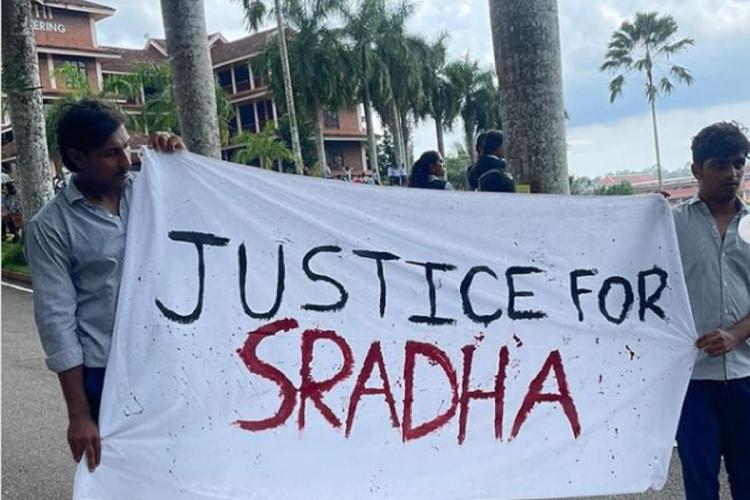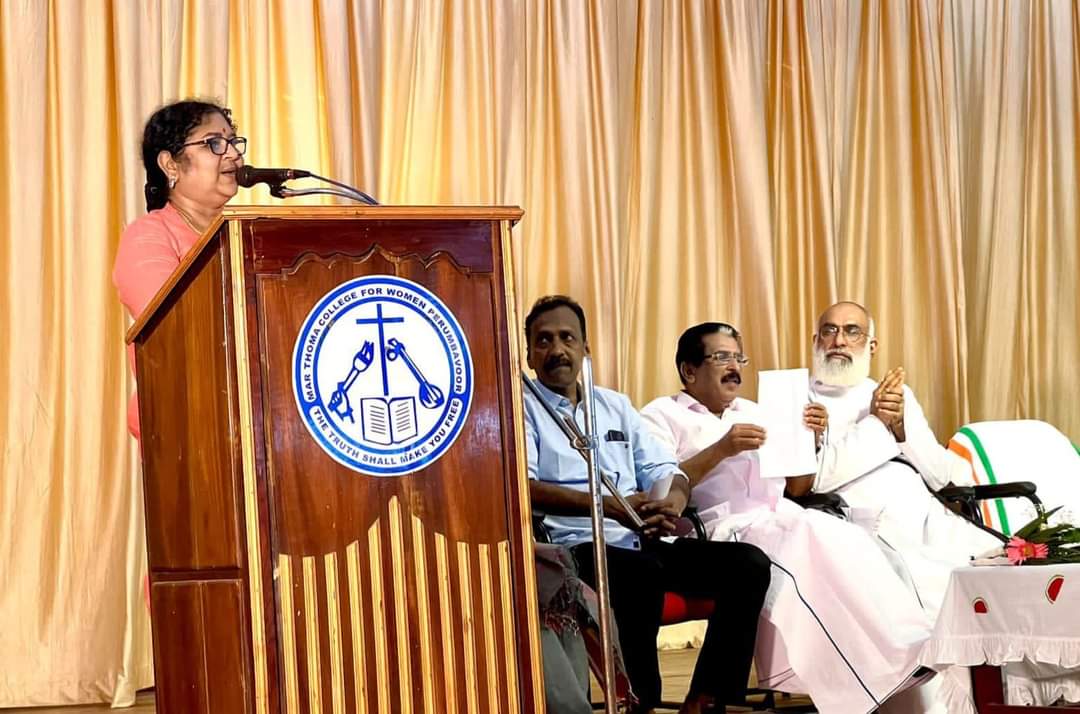
‘Like military garrison’: Kerala engineering college under fire over student’s suicide

It has been almost two weeks since Shradha Satheesh, a 20-year-old food technology student of Amal Jyoti College of Engineering (AJCE), died of suicide due to alleged harassment by the faculty and college management. The Koovappally-based college in Kerala, run by the Catholic Diocese of Kanjirappaly, has been under tremendous fire from its students, who have been staging unrelenting protests demanding an inquiry into Shradha’s death.
The students called off their strike after the government intervened and declared to institute an inquiry by the Crime Branch of the state police. Even though the inquiry is on, Shradha’s family and friends are not satisfied. They have accused the AJCE management for her death. “We try to take everything positively. Despite that we lost our child. Let the investigation take its course, and we will see what happens,” Raghunandanan a close friend of Shradha’s father Satheesan told The Federal.
Also Read: From suicide to possible murder: IIT-Kgp student’s mother waits to know ‘reason’
Given that Shradha’s customary posthumous rites were still incomplete, it was not appropriate for The Federal to approach her mourning parents for comments. However, The Federal spoke to her college mates and most of them seemed enraged. But they cannot make any statement in public because of an agreement they made with the management in the presence of the Higher Education Minister R Bindu. Yet, some of them came forward to speak about the state of affairs in the college campus on the condition of anonymity.
“Here, it’s just like a military garrison, ruled with Victorian moral code. Girls are not allowed to talk to boys after the class hours. You won’t believe we have separate skywalks, connecting hostels to the main campus. No boy is allowed to walk through the girl’s hostel skywalk and vice versa,” a 20-year-old girl student told The Federal.
Another girl student chipped in, “If you are found communicating with a boy, you are done. Exaggerated stories of your ‘immoral life’ will be communicated to your parents. As far as I am concerned, my parents sort of like their approach. So I do not complain about anything here at home.”
On the day of her death, she was reprimanded for looking at a notification on her mobile phone, said an engineering student. She got a dressing down from the hostel warden who happens to be a nun.
Boys, too, are not immune to this kind of harsh treatment.
Sharis Mohammed, the writer of the well acclaimed Malayalam film Jan Gana Mana, likened Shradha’s suicide to an institutional murder in an emotional video posted on his social media handles.
“I am an alumnus of this college. I have undergone all these torturous treatments from the management. The only difference between Shradha and me is that I am still alive,” Sharis said, recalling his days at the AJCE. “When a student like Shradha ends her life inside the campus, or inside the hostel, it is not a suicide. I would rather call it an institutional murder. If my life had a retake, the only decision I would like to reverse is my selection of college. I would not enroll there to study in any circumstances,” Sharis added.
The college management, however, maintained that they have nothing to do with her unnatural death. “We want this case to be inquired to the minute details and then the truth would prevail and we will be on the clear,” said Father Dr Mathew Paikatt, manager of the college.

Father Paikatt downplayed the protests by students calling them politically motivated. “The protests are externally motivated and politically coloured. I am not naming anyone, but they do not have any concern towards the slain student. They are using her death as an opportunity to settle scores and present their personal claims. Only 200 out of 3000 plus students in the college participated in the protests,” claimed Father Paikatt.
Shradha’s family and relatives have levelled serious allegations against the college management. According to Raghunandanan, college officials were not only very insensitive in informing about her death to the parents but they also lied to the hospital authorities. Concealing her attempted suicide, they told them that Shradha had fainted in the hostel.
Father Paikatt refuted the allegation that the management was insensitive to Shradha’s parents. “Our primary responsibility is towards the parents of the students. They are paying us and this is a self-financed institution. We have not done anything against their well-being,” he said.
Commenting on other allegations, Father Paikatt said, “It is true that we have taken action against students who violated our rules. We have caught boys and girls who were involved in immoral activities at camera-blind spots in the campus, including toilets, and informed their parents. We will continue doing it in the future too.”
“We are not against love, but we will not allow casual physical intimacy crossing all limits. Those students who involve in such activities are irresponsible. Even in Europe, they have certain ethics in relationships. Here the boys and girls have none of those ethics, European or Indian. The culture of ‘prematheppu’ (a casual fling that often results in one of them ditching the other) will not be allowed,” asserted Father Paikatt.
Also Read: Kerala: Five of family found dead; police suspect murder-suicide
What happened in Amal Jyothi is not an isolated incident in Kerala’s self-financed educational institutions. There have been at least five suicides in the past five years or so with Jishnu Pronnoy’s case standing out.
Prannoy, an 18-year-old student of Nehru College in Kerala’s Thrissur district, was found dead on January 6, 2017 inside the washroom of his college hostel. It was alleged that the college management had reprimanded him for making false accusations against them. A CBI inquiry was instituted after massive protests broke out across the state. But the college authorities were absolved.
According to the data tabled in Parliament by the Union Ministry Human Resource Development, 103 students across the country committed suicide between January 2018 and March 2023, majority of them from top institutions like IITs, IIMs, AIIMS and NIITs. But in Kerala the situation is different with many of the suicides being reported from private colleges.
Minister Bindu ascribes students’ suicides to moral policing. “Many private colleges, lacking an open mindset, put students under needless stress in the name of discipline. The space for healthy connections has been eliminated by moral policing and surveillance at colleges,” the minister said.
There is a message to our society in these suicides, said students. Change its attitude towards the young people.
(Suicides can be prevented. For help please call Suicide Prevention Helplines: Neha Suicide Prevention Centre – 044-24640050; Aasara helpline for suicide prevention, emotional support & trauma help — +91-9820466726; Kiran, Mental health rehabilitation — 1800-599-0019, Disha 0471- 2552056, Maithri 0484 2540530, and Sneha’s suicide prevention helpline 044-24640050.)


